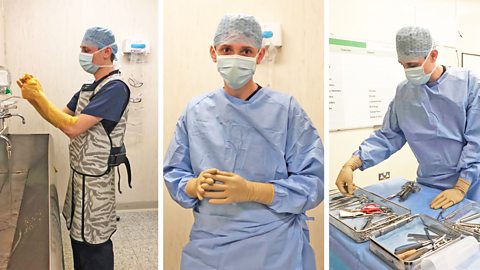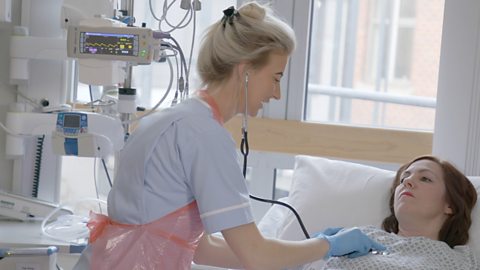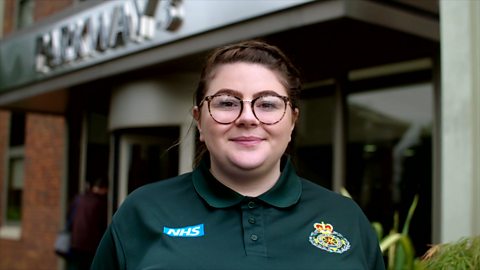Meet Connor, a student orthopaedic scrub nurse who assists surgeons while they operate. Part of our Bitesize world of work series.

I love my job because I work as a small but very significant part of a much bigger team. I get to work with some of the most amazing doctors and nurses.

What is your role?
I work as an orthopaedic scrub nurse for the Countess of Chester Hospital NHS Foundation Trust. Orthopaedics is a department that focuses on bones, joints, ligaments, tendons and muscles. I work in a theatre where surgeries take place and am responsible for checking and preparing implants and surgical instruments ahead of a procedure. I also assist the surgeon during operations, which requires a lot of organisation and concentration.
What does a typical day look like in your job?
My days can be made up of both planned and unplanned surgeries. A "planned" surgery happens when a patient has been booked in for an operation like a hip or knee replacement. An "unplanned" surgery or "trauma" happens when someone has been injured unexpectedly.
Did you always know what you wanted to do for work?
No, I hadnÔÇÖt always wanted to be a nurse! At secondary school, I chose Business Studies, History, French and Religious Studies for my GCSE options and originally liked the idea of being a flight attendant but then I changed my mind. So, at college, I studied a diploma in Health and Social Care and, as part of the course, I went on a placement to the same care home that my grandad lived at. It was then that I realised I was really passionate about caring for people. I think caring and compassion are great characteristics to have if youÔÇÖre thinking about a career in nursing.

You dont have to decide what career you want straightaway when youre young as long as you stay focused and determined youll get to where you want to be.

What's your journey been to get to where you are now?
After college, I moved to Chester to start a nursing degree at uni. I'm dyslexic and, 18 months into the course, I was starting to feel overwhelmed by the academic, non-practical side of things so I decided to take a break. During that time away from uni, I got a job as a theatre support worker at my local hospital and worked there for two years. It was there that I discovered how much I enjoy working in a surgical environment and being involved in operations, so I decided that being a scrub nurse specifically was the right choice for me. With the support of my colleagues, I went back to uni and finished my degree.
What do you like best about your job?
The best part for me is the satisfaction I get from helping people. I think the NHS is appreciated more now because of the coronavirus pandemic. I also love that every day at work is different and packed with variety ÔÇô I'm constantly learning new things because no two procedures are ever the same. I'm new to my role so having a supportive team around me who I can learn from is something I'm super grateful for.
Fun fact
I got a surprise one day at work when I saw a baby being born through a cesarean section (C-section) delivery. I donÔÇÖt usually work around babies, so it was a completely new experience for me!

What to expect if you want to be a nurse
- Nurse average salary: NHS bands 5-6. Read more about . Salaries will differ in private healthcare.
- Nurse typical working hours: 37 to 42 hours per week
What qualifications do you need to be a nurse?
You can get into this role via a university course. You can do a degree in adult nursing approved by the Nursing & Midwifery Council. Some degree courses let you study another area of nursing alongside adult nursing. You may be able to join the second year of a nursing degree if you already have a degree in:
- a health-related subject
- psychology
- life sciences
- social work
Full-time courses usually take 3 years. You may be able to do a degree apprenticeship in nursing if you work in a healthcare setting like a hospital. The apprenticeship takes around 4 years and is a mix of academic study and on-the-job training.
Sources: LMI for All, National Careers Service, NHS Health Careers
This information is a guide and is constantly changing. Please check the website for the latest information and all the qualifications needed.
Find out more
For more information about careers in nursing, you can check out:
- The
- The
For careers advice in all parts of the UK visit: , , and .

How to become a nurse. collection
A collection of nurse job profiles and information about what the role entails.

Job inspiration: Careers in healthcare and frontline services. collection
Hear from people working across the healthcare sector and in frontline services, including some roles you may not know existed!

┤¾¤¾┤½├¢ One's Ambulance: Meet the real life heroes. collection
A collection of articles and stories from ┤¾¤¾┤½├¢ One's series Ambulance.
